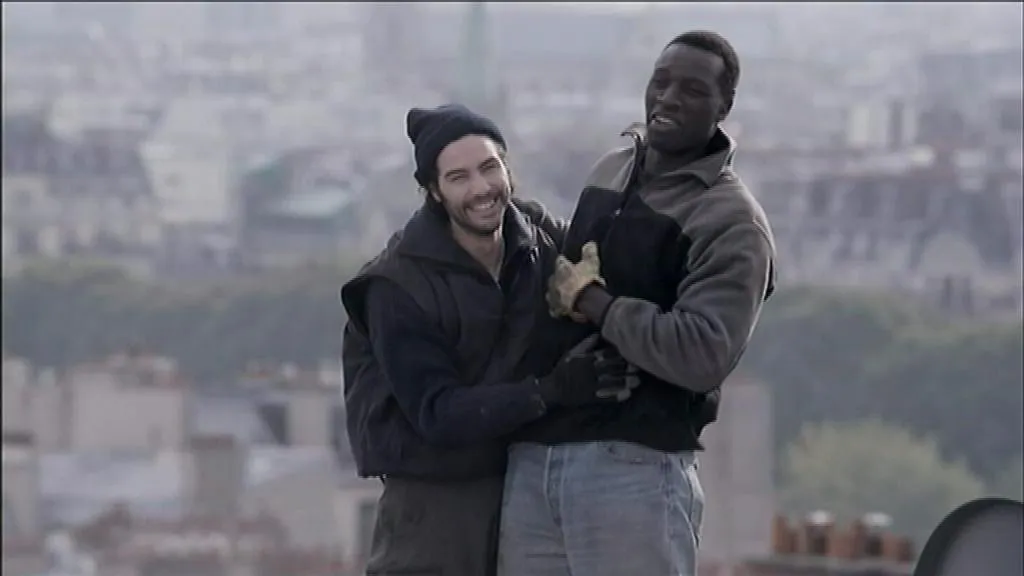This year, Omar Sy has the distinction of being in the biggest film of the year as one of the costars in Jurassic World. Having broken out with his memorable performance in The Intouchables, he’s appeared in a variety of films in both France and Hollywood, including last year’s Mood Indigo and to X-Men: Days of Future Past. At this point, he is truly on the verge of becoming an international star, an interest in Hollywood and loved in his home country of France. In Samba, Sy plays a man who is unknown, living on the outskirts of France as an illegal immigrant, and just barely managing to stay in the country.
As title character Samba, he is a food worker who lives with his uncle, but does not have a work visa or citizenship. He wants to be a citizen of France, but his application was refused and he’s been arrested. A legal aid (Izïa Higelin), and volunteer Alice (Charlotte Gainsbourg), are assigned to help him, but almost immediately realize that legally, Samba doesn’t have a strong case for staying in the country. Samba is ultimately told he “has to leave” (he is now an illegal) making it nearly impossible to find work, unless he uses fake IDs. While trying to find enough work to get by, he meets another illegal immigrant (Tahar Rahim), who becomes his friend.
Structurally, Samba certainly has problems which can’t be denied. There are several moments that feel almost as if a scene was left out, and the movie’s conclusion is a bit too simplistic and Hollywood for a movie which aggressively tries to avoid clichés. But the biggest issue with the film, is its clearly defined three-act structure which while intentionally disjointed, is weighed down with slow first and third acts. The first act, focusing on Samba’s arrest, trail, and struggle to find work of any kind, are extremely somber. It works in establishing the seriousness of Samba’s desperate situation, but it is also a tough, long watch.
The second act (signified by a Stevie Wonder song) is considerably more energetic. And a big shot of adrenalin is infused in the film by Tahar Rahim’s. Sy and Rahim’s scenes play more like a good buddy comedy, and the tonal shift is refreshing and energizes the movie. Not only because of Rahim (who is so lovable in the film), but because of the juxtaposition Rahim and Higelin provide to the budding friendship-relationship between Gainsbourg and Sy. While Rahim and Higelin live for every moment, Gainsbourg and Sy can’t help but think of the long term. When Rahim leaves the film in the third act, his absence is felt and the film shifts once again, this time return to the earlier somber tone, but this time feeling a bit too melodramatic.
But even with the narrative problems, the relatively intimate film really does work because of the cast. Sy is more than capable of anchoring a film, and plays Samba as a decent (but imperfect) man whose growing frustration over living on the outskirts of society makes it easy to empathize with his plight, despite how silent and contained he is throughout the film. Gainsbourg is an actress who is often her best when she allows her inner weirdness to shine. She can play very ordinary people with an odd private life better than most actresses today…and it is always nice to see her play funny, sexy women, as she does in this. And Rahim has never been more charming (and he’s been charming in a lot of movies). I just wish we’d had a chance to see the trio together a few more times, because in their few moments, such as when Rahim asks Gainsbourg to dance, we see their very different personalities at play.
This is technically writer/director Olivier Nakache and Eric Toledano’s follow up to The Intouchables, and as will that film, they deal with social-political issues with a light touch. It is also based on a novel, and you can feel the film’s literary roots…perhaps to the film’s detriment. The movie feels as if it needed to break away a bit, and even allow itself to use some cinematic conventions. When the movie uses buddy and romantic comedy conventions, there is an energy to the film and subversiveness to the conventions which enlivens the film. When the film takes things deadly, realistically serious or gives in to melodrama, the film can be a tough watch to get through. Which is unfortunate, because there are a multitude of moments when this film managed to hit me on a deep, emotional place.
Lesley Coffin is a New York transplant from the midwest. She is the New York-based writer/podcast editor for Filmoria and film contributor at The Interrobang. When not doing that, she’s writing books on classic Hollywood, including Lew Ayres: Hollywood’s Conscientious Objector and her new book Hitchcock’s Stars: Alfred Hitchcock and the Hollywood Studio System.
—Please make note of The Mary Sue’s general comment policy.—
Do you follow The Mary Sue on Twitter, Facebook, Tumblr, Pinterest, & Google +?









Published: Jul 24, 2015 12:53 pm